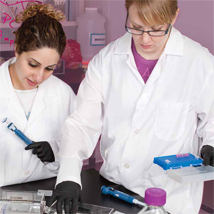Tamara Hariz and Jennifer Bourk are tracking cougars. Although they can see a broad swath of cougar terrain from the west-facing, fourth-floor windows of their lab in the Cousins Science Centre at Lethbridge College, they seldom get a chance to enjoy the view. Instead, the two research students are hunting their prey with the tools of the microbiologist.
from the west-facing, fourth-floor windows of their lab in the Cousins Science Centre at Lethbridge College, they seldom get a chance to enjoy the view. Instead, the two research students are hunting their prey with the tools of the microbiologist.
Rather than searching for footprints of the big cats along creek beds, Hariz and Bourk are studying much, much smaller evidence: DNA. When they finish their work, they will have created a database of cougar family relationships that will allow future researchers to tell where an animal originated and, by studying hair samples found in the wild, reconstruct its travels. This helps wildlife biologists understand what encourages a cougar to range many kilometers from its original territory.
The two may seem unlikely cougar chasers. Hariz started as a nursing student at Lethbridge College, while Bourk’s background is in accounting. Hariz owns the Burger Baron in North Lethbridge; Bourk is returning to academics after starting a family. Yet here they are, sequestered amid the centrifuges and test tubes, sporting white lab coats as Cellular Molecular Technician program students and learning about the times and travels of North American carnivores. What gives?
“This is a huge opportunity not everyone gets,” says Hariz. “We are on the edge of breaking out new technology. It’s worth every minute.”
The two women agree running a business and accounting require immense attention to detail and organizational skills. So does messing with cougar DNA. “Making a burger is no different than running a PCR [polymerase chain reaction],” says Hariz, without a trace of a smile. Well, except, maybe, for the pickles. But one gets the point.
So while they may never see a cougar in the wild, they’ll know more about the felines than most. The days in the lab are punctuated with the thrill of discovery.
“When you explain it to people, it looks to be like you’re doing the same thing every day,” says Bourk. “But it’s not repetitive to us. It just depends how you’re wired.” Adds Hariz: “When the particulate gene you’re looking for shows up, it’s exciting. It’s like finding a hair at a crime scene and determining who it belongs to.”
The women were set to work on the project until, as Hariz notes, they get what they’re looking for. By April, they had isolated the gene determining gender and were working on typing each sample to determine individual characteristics.
Hariz pl ans to extend her education to be able to work in stem cell research one day.
“I started in nursing to help others,” she says. “I’m still interested in doing that. So imagine being able to help people repair their own bodies through non-invasive methods. Imagine being able to grow a liver, rather than having a transplant.”
Bourk, who has been working on cereal crops at the Lethbridge Research Centre, hopes to continue in agricultural research. “The methods are the same,” she says. “You’re working with cells, whether they belong to cougars or crops.”


